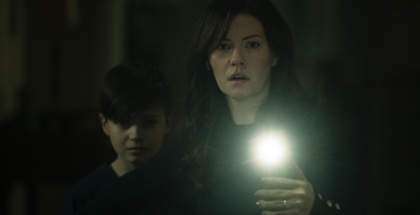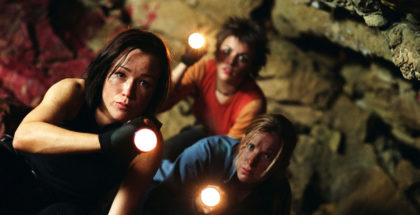Longlegs: Disturbing and unsettling
Review Overview
Cast
8Clarity
5Composition
8David Farnor | On 30, Oct 2024
Director: Osgood Perkins
Cast: Nicolas Cage, Maika Monroe
Certificate: 15
Just when you think you’ve seen Nicolas Cage do everything, along comes Longlegs. Directed by Osgood Perkins, it’s a serial killer thriller that gives the Con Air and Pig star the opportunity to flex some muscles perhaps not seen since Vampire’s Kiss – and he descends into horror with all the unsettling glee you’d expect. The rest of the film, though, is somewhat at odds with Cage’s presence.
Cage’s Longlegs is being pursued by Lee Harker (Maika Monroe), a young up-and-coming FBI agent with gently psychic abilities. Like Clarice Starling drawn into Hannibal Lecter’s web, she finds herself fascinated by the enigmatic, elusive killer – someone who leaves notes in a Zodiac-like code behind their trail of carnage. The actual killings, we learn, aren’t done by Longlegs at all, but by a family member, which gives him a Charles Manson-esque quality.
Stitching all this together, Monroe’s performance as Harker is key to the film’s success. Monroe, who was so remarkable in It Follows, internalises the trauma and violence she’s absorbing through each nasty crime scene, never fully relaxing at any time she’s on screen – and perhaps at her wariest when having to talk to any living person (including Agent Carter, played with gravitas by a scene-stealing Blair Underwood). As she lurks in the darkness, evidence and open spaces sprawling around her, Perkins invites us to join her in becoming immersed in the shadows and whispering mystery.
And then in walks Cage. If Monroe is chillingly understated, Cage dials it up to 12. He more than meets the brief, whether he’s singing happy birthday and chanting with a soft, high-pitched giggle or suddenly erupting into screams worthy of a rock band’s frontman. It’s a bizarre, disarming and entirely unfathomable turn that gets spooky clarity right near the end, as he starts talking more seriously about his plans.
Perkins frames all this with careful precision, from child’s point-of-view shots to an effective home movie-style aspect ratio for flashbacks, but the script feels less clinically crafted. Meaning is often sacrificed for atmosphere for the slow-burn first half, leaving the muddled final act having to hurry to try and find some lucidity. And yet there’s a striking impact in that rushed deluge of evocative and haunting images, as the film deliberately brings Monroe’s cautious existence into collision with Cage’s live-wire malevolence – a living room sequence involving a doll is excruciatingly tense. For all the familiar genre framework on offer, some things are left nigglingly unexplained, so that your brain is still replaying them after the credits have rolled – hours later, you realise that’s the point.





















